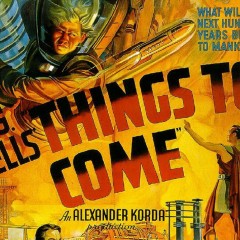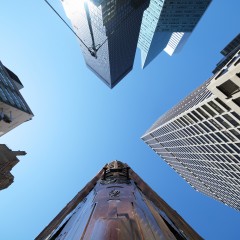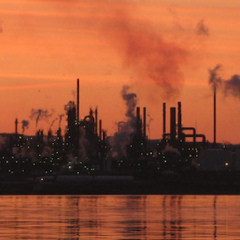Roundtable: Things to Come
The CCL will be hosting a Science Fiction Roundtable to conclude our undergraduate module on Science Fiction. The roundtable will take place on Wednesday 6th May 2015 in Room 540 of Birkbeck's Malet Street building (no. 1 on this central London map). Featuring guest speakers who specialise in science fiction research and teaching, the panel is themed around the following questions: what is science fiction? How should we understand genre, and which specific intellectual traditions have shaped debates concerning genre through the 20th century? What is the relationship between science fiction and SF film and television? And how have visions of futuristic technology evolved since Wells' early scientific romances? Our guest speakers include Christopher Daley (Westminster / Brunel), whose research focuses on British Science Fiction during the Cold War era, Grace Halden (Birkbeck), a cultural historian who is interested in representations of technology in science fiction and popular culture since 1945, and Tony Sweeney (South Essex College), who teaches science fiction Film & TV. The discussion will be chaired by Joe Brooker and Caroline Edwards, who teach SF at Birkbeck. See below for the event poster, or you can download it here. Tweet Banner and poster image by James Vaughan under a CC BY-NC-SA...
Conference Report: Stage the Future 2
By Dr Christos Callow Jr. Stage the Future 2: The Second International Conference on Science Fiction Theatre, Arizona State University, 6-7 March 2015 In March 2015, the future was staged again, this time in Tempe, Arizona. The second international conference on science fiction theatre, Stage the Future II, was hosted by the Center for Science and the Imagination at Arizona State University and took place in the Marston Exploration Theater in the ASU’s Tempe campus. The event lasted two days, March 6-7, and was organised by myself and Susan Gray (the conference’s founders) and a large organising committee, including Carol Stewart from Bellarmine University, Prof. Carrie J. Cole from Indiana University of Pennsylvania as well as a local team from ASU, Prof. Boyd Branch, Prof. Erica Hughes and Miranda Giles. I’d like to thank both visitors and hosts for helping bring this to life. Finally, I am of course grateful to our delegates; many of them had come a long way to get to Arizona for the event. Unfortunately, our first keynote speaker, the theatre critic Howard Sherman didn’t make it to the conference due to a weather-related flight cancellation. We were fortunate however to welcome ASU’s own Prof. Thomas Seager whose keynote was titled “The Story of Science”. An engineering professor himself, he talked about the relation between science and art and how each needs the other – science fiction being of course a great example of how art can help scientists speculate about possible solutions to the problems they’re researching; it was an excellent talk that would be a solid introduction to any science fiction event and truly kickstarted the conference. This was followed by the first panel. Prof. Carrie J. Cole spoke about the Uncanny Valley in sci-fi theatre and argued for a Thespis Test (like a Turing test but for robot actors). Next we had ASU’s Prof. Melissa Thompson who presented her performance work as “Ambien Cassandra” and Carol Stewart who gave a thought-provoking paper on sci-fi theatre and method acting (Robin Abrahams had some interesting thoughts to blog about this). Next was a panel – appropriately titled “Pop! Goes the Science Imagery” – in which Jeff Sachs from ASU presented a case study of the London-based immersive theatre company Punchdrunk and Doctor Who’s The Crash of the Elysium, an immersive Theatre experience for 6-12 year olds – Sachs talked about the freedom it gives to children and “how much influence/agency children have over the performance”, Robert Kroll from Jackson College discussed (via skype) Reality vs Continuity in the Doctor Who Proms (part of the BBC Proms series) and the kind of, in his words, “total sensory theatrical experience”...
‘What is left that’s worth the telling?’: Novels of financial crisis, and the compelling case of Don DeLillo
by Christopher Hartley We live – it seems undeniable – in an era of crises: the global financial crisis, the debt crisis, the cost of living crisis, the housing crisis, the population crisis, the constitutional crisis, the public spending crisis. These crises, amongst a swathe of others, punctuate our collective stagger towards and beyond our own personal debt and mid-life crises. With so much to worry about, it’s tempting to respond to the less pressing crises occurring simultaneously in the academy – in economics or the humanities, for example – with a resigned shrug of the shoulders. If we’re all doomed anyway – powerless to do anything on our own – why bother worrying? Grab what you can, defend what you have, and let the devil take the hindmost. In 1990 Saul Bellow lamented the ‘distraction […] which obviously originates in the endless crises of this century’ (155). Post-2008, with despair threatening to replace hope, it’s tempting to sympathise with Benno Levin, the washed-up and doomed nihilist of Don DeLillo’s novel Cosmopolis (2003), when he asks ‘what is left that’s worth the telling?’ (61). There is reason to suspect that much current angst has a common origin, diffused through a range of distraction-inducing sub-crises. It may be a platitude these days, but it’s as true of crises as it is of information technology, so it’s one worth repeating: we live in an interconnected, globalised world. In a recent column in the Guardian, the economic journalist Paul Mason reminded readers that the overarching influence behind what Nigel Dodd calls ‘a crisis of legitimacy’ (3) – reaching from Greece to Glasgow – remains the 2008 financial crisis. If we’re to address the conditions that caused it, and the other crises it has triggered, Mason argues, we need nothing less than ‘a new theory of capitalism’. In the immediate aftermath of the global financial crisis, the intellectual custodians of economic orthodoxy were queueing up to offer mea culpas. The Princeton economist Paul Krugman announced that ‘we live in a golden age of economic debunkery; fallacious doctrines have been dropping like flies. […] if you haven’t been radicalized by recent events, you haven’t been paying attention’ (Krugman, 2013). Alan Greenspan, the former Chair of the US Federal Reserve, nicknamed ‘the Oracle’ during the boom years before the crisis, acknowledged in 2008 that ‘the whole intellectual edifice’ underpinning the global reach of neoclassical economics’ obsession with equilibrium-trending mathematical models such as the arcane Dynamic Stochastic General Equilibrium model (DSGE), ‘collapsed in the summer of last year’ (Greenspan, 2008). Heterodox economists, marginalised in the academy during the decades prior to the global financial crisis, frequently...
Petrocultures Panel
Birkbeck Arts Week 2015 Environmental Futures: Oil, Ecology, Petrocultures Monday 18th May 2015, 2-5pm Oil shapes our geopolitics and impacts upon the cost of day-to-day living. But what role does oil play within culture? This panel considers literature’s engagement with the oil economy and the opportunities for a participatory democratic citizenship that the cultural critique, and monitoring, of oil affords. In the 21st century, we remain beholden to the oil economy. Oil shapes our geopolitics, our economic forecasts, the global transportation of our commodities, and impacts upon the costs of day-to-day living. Since the invention of the internal combustion engine, the petroleum industry has risen to such prominence that we cannot understand modern capitalism outside of its history as petro-capitalism. And yet, surprisingly, literature has had little to say about the dominance of oil in our lives. The recent emergence of “Petrocultures” as an academic field of enquiry seeks to redress this apparent silence, opening up a space within literary, artistic and cultural production to consider the cultural role that oil plays. How, for instance, is oil depicted in the novel? In what ways can literature imagine a world without oil, where our movements are restricted to the pace of walking? And what opportunities for a more engaged democratic citizenship does the cultural critique of oil afford? This panel will take place as part of Birkbeck's Arts Week 2015. Dr Graeme MacDonald is Associate Professor of English & Comparative Literary Studies at the University of Warwick, and his current research examines petrofiction and resource culture. Dr Jennifer Gabrys is Reader in Sociology at Goldsmiths and Principal Investigator on a European Research Council funded project “Citizen Sensing and Environmental Practice: Assessing Participatory Engagements with Environments through Sensor Technologies,” which investigates citizen participation in monitoring air pollution at fracking sites. Dr Caroline Edwards is Lecturer in Modern & Contemporary Literature at Birkbeck, and her work on science fiction and post-apocalyptic narratives explores the relationship between futurity and scarcity of resources in post-capitalist communities. The panel discussion will be followed by a poetry reading by Michael McKimm from his recent collection, Fossil Sunshine (Worple Press, 2013). Michael’s research in writing this collection was funded by Arts Council England, which allowed him to work with geologists and earth scientists investigating climate change and the oil industry. CLICK HERE to listen to the podcasts of this panel. Click here to download the Petrocultures Panel poster, or see below for more information. Tweet Featured image by Glenn Euloth under a CC BY-NC-ND license. Poster image by Classic Film under a CC BY-NC...





Recent Comments